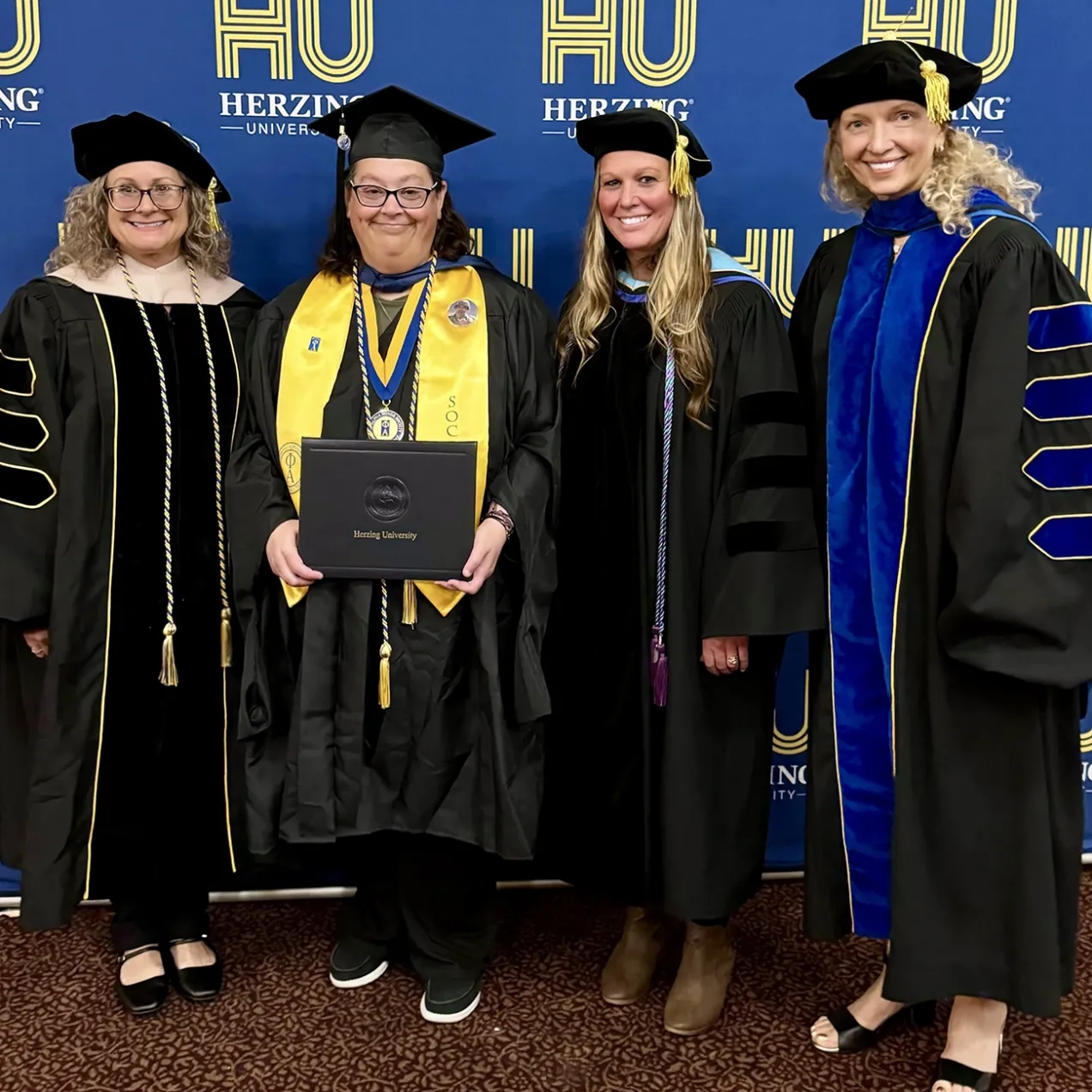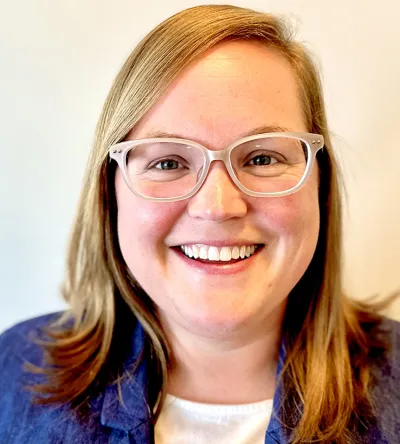Quick facts about our CSWE-accredited Master of Social Work program
| Accreditation | CSWE accredited;† Accredited by the Higher Learning Commission |
|---|---|
| Eligibility | Current bachelor’s degree holders in a non-social work major |
| Format | 100% online classes delivered asynchronously, with hands-on clinical field practicums; curriculum includes virtual, simulated experiences to enhance distance learning |
| Field practicum | We can assist students in finding a practicum site, as well as allow paid and employment-based practicums |
| Areas of practice | Clinical-focused social work curriculum with your choice of electives across 3 areas of practice |
| QuickPaths | Transfer credit, stackable credentials, and adaptive learning technology build a faster pathway to a higher education with Herzing University |


Satisfaction rate
Our overall student satisfaction rate, according to the 2024 Herzing Graduate Survey.
Advocate and empower those in your community as a social worker
The Master of Social Work degree program option is a 60-credit online graduate program which prepares you for a career as a social worker.
The CSWE-aligned program curriculum provides students with advanced knowledge and skills in human behavior in the social environment, social policy and services, clinical social work interventions, psychosocial assessment & clinical diagnosis, and much more.

Career-focused curriculum
Discover the crucial knowledge and skills required to succeed in your work and build a foundation for continued career growth.
Flexible schedule
You can take classes during the day or in the evening. We work hard to help you maintain school-life balance, striving to be as flexible as possible for busy non-traditional students.
Virtual services
Access to extensive virtual services, including academic advising, tutoring, support services, technical support and library services.
Lifelong support
We support your ongoing career advancement by providing comprehensive, personalized student services with lifelong career coaching.
Rolling admissions
No application deadlines to worry about. Apply when you’re ready and prepare to get started soon.
Your pathway: classes and curriculum details
Our curriculum is designed to prepare you to become a culturally informed clinical practitioner through both academic coursework and practical application. The program emphasizes lifelong learning, professional development, service, networking, and adherence to the National Association of Social Workers (NASW) Code of Ethics.
All didactic, lecture-style courses are delivered online, with 900 total field practicum hours. You will choose electives across three career-focused social work areas of practice: Mental Health, Medical Social Work, and Children, Families, and Aging Services.1
Current Bachelor of Social Work (BSW) holders may consider our Advanced Standing MSW track.
| Program | Months 2 | Credit |
|---|---|---|
| Master of Social Work (MSW) | 24-48 | 60 |
i. Average number of months for students to complete the program for full-time (24 months) and part-time (48 months) enrollment.
Required Core Courses
All courses, 37.00 semester credit hours, are required.
Required Project Residency Core Courses
All courses, 14.00 semester credit hours, are required.
Required Area of Practice Elective Courses
9.00 semester credit hours are required. Students should select three courses from the list below to learn more about areas of social work practice. Course availability depends on enrollment.
Distribution of Contact Hours by Course
Distribution of Contact Hours by Course Course Number Lecture Clinical Practicum Total Contact Hours Credits MSW 500 30.00 30.00 2.00 MSW 501 30.00 30.00 2.00 MSW 510 45.00 45.00 3.00 MSW 520 45.00 45.00 3.00 MSW 521 45.00 45.00 3.00 MSW 530 30.00 30.00 2.00 MSW 535 200.00 200.00 3.00 MSW 540 45.00 45.00 3.00 MSW 545 200.00 200.00 3.00 MSW 600 45.00 45.00 3.00 MSW 610 45.00 45.00 3.00 MSW 620 45.00 45.00 3.00 MSW 630 45.00 45.00 3.00 MSW 640 45.00 45.00 3.00 MSW 650 30.00 30.00 2.00 MSW 655 250.00 250.00 4.00 MSW 660 30.00 30.00 2.00 MSW 665 250.00 250.00 4.00 AREA OF PRACTICE ELECTIVES MSW 624 45.00 45.00 3.00 MSW 626 45.00 45.00 3.00 MSW 628 45.00 45.00 3.00 MSW 622 45.00 45.00 3.00 MSW 638 45.00 45.00 3.00 MSW 632 45.00 45.00 3.00 Totals 690.00 900.00 1,590.00 60.00
Choose a CSWE-accredited MSW program
Our MSW program has undergone the rigorous evaluation process required to earn full accreditation from the Council of Social Work Education (CSWE).✝
CSWE accreditation proves excellence in social work education meeting the highest professional standards—and reflects the dedication of faculty, field instructors, and program leadership.
Herzing University devotes this dedication to every student enrolled in the MSW program. Choose the Herzing MSW program and join a passionate team of lifelong learners eager to help you find career success as a social worker.
Choosing the right area of practice electives
When you enroll in the Herzing MSW program, you will choose elective courses across three different areas of practice:
Prepare for practice through field education
Your education begins by establishing key social work concepts through didactic coursework and culminates in field practicums putting your learning into practice to fully prepare you to succeed as a social worker.
Discover how to apply social work knowledge, values, skills, and cognitive affective processes in many potential types of practice settings, including:
- Schools
- Hospitals
- Mental health facilities
- Community agencies
- Criminal justice organizations
- Counseling centers
Field education informs your understanding of how social work theory and research inform social work practice.
Apply what you’ve learned in career-focused field practicums to fully prepare for career success.
Practicum highlights
- General and Specialized field practicums
- General Field Practicum: 400 hours, 2 semesters
- Specialized Field Practicum: 500 hours, 2 semesters
- Where you complete each practicum can vary widely based on your location and electives you choose. We encourage you to choose your preferred Field Agency, but our Director of Field Education will provide support should you need help securing practicum sites.
Your practicum experience
Field education is crucial to becoming fully prepared for career success as a social worker. Learn more about how our program’s field education component is designed and how it works—and access important field education resources.
Tuition & Cost
Tuition & Cost
The cost of tuition for the Master of Social Work program is $675 per credit.
You can potentially earn even greater savings by transferring credit from prior college coursework, applying for financial aid, or potential partnership opportunities through your employer.
Our goal is your career advancement. That's why we are always working to improve our curriculum and processes to make our program as affordable as possible while preparing you best for success in your work.
Scholarships & Financial Aid
You may be eligible for multiple scholarships and grants, both through Herzing University and several national scholarship websites.
Military/Veteran Discounts
Veterans, Active Duty U.S. Servicemembers, and spouses may qualify for a 10-20% tuition discount.
MSW program enrollment requirements
The requirements for admission to the traditional MSW program track are:
- Minimum 2.5 GPA in baccalaureate degree
- Prospective graduate students must have completed a bachelor’s or graduate degree not in social work from a college or university accredited by an agency recognized by the U.S. Department of Education or have completed a three- or four-year bachelor’s degree at a foreign college or university recognized as equivalent to a U.S. bachelor’s degree by an approved foreign credential evaluator
- Transcript from baccalaureate degree program
- Personal statement addressing MSW prompts – see admission advisor for details
- Optional Recommendations for both traditional and advanced standing MSW tracks: students may choose to submit recommendations to be considered with their application but are not required
Please contact admissions for details regarding the application.
Phi Alpha Honor Society
Herzing University established the Delta Kappa Sigma Chapter of Phi Alpha International Honor Society in 2024 with Dr. Hyacinth McKee as the Faculty Advisor. Membership in this chapter represents the highest honor a student can receive in our social work program. Members enjoy several benefits, including:
- Your academic excellence is recognized. Phi Alpha honors high-achieving students (3.5+ GPA), rewarding those who go above and beyond and establish themselves as eager lifelong learners.
- Engage with the community. Make your impact outside of the classroom with access to organized volunteer work and community events. Get involved with service, advocacy, and awareness initiatives.
- Networking and career opportunities. Earn access to a large network of social work professionals, alumni, and other students. Become an active participant in the social work community and expand your career possibilities.
Membership in Phi Alpha rewards your academic success and accelerates your path to career success well before you are set to graduate with an MSW.
What you can do with a master’s in social work
While the field of social work has evolved to become more diverse and specialized, core master’s degree courses prepare you for a wide variety of job possibilities.
Choose the area of practice electives best reflecting the social work career path you want to walk.
Job titles can vary widely with overlap across each area of practice.2
- Behavioral Health Therapist
- Mental Health Social Worker
- Psychiatric Social Worker
- Psychosocial Coordinator
- Residential Therapist
- Substance Use Disorder Clinician
- Suicide Prevention Specialist
- Therapist
- Victim Advocate
- Home Health & Hospice Social Worker
- Hospice Social Worker
- Medical Social Worker
- Oncology Social Worker
- Residential Treatment Coordinator
- Social Work Case Manager
- Adoption Social Worker
- Adult Protective Services Worker
- Child Protective Services Supervisor (CPS Social Worker)
- Domestic Violence Advocate
- Family Protection Specialist
- Family Resource Coordinator
- Family Service Worker
- Foster Care Social Worker
- Gerontology Social Worker
- Pediatric Social Worker
- School Social Worker
- Veteran Affairs (VA) Social Worker
- Youth Specialist
Job Outlook
Employment of social workers is expected to increase across all specialties, according to the Bureau of Labor Statistics.
Among available BLS occupational groupings, employment of mental health and substance abuse social workers is expected to rise the fastest (11% growth).
Accreditation & Recognition
Our accredited & recognized online school
We strive to earn rank as one of the top private, nonprofit universities in the United States. Just as you work every day to become the best version of yourself, so do we as a university.
We are proud to have attained institutional and programmatic accreditation in addition to industry recognition for our accomplishments helping students earn a college education and find career success.
✝Herzing University's Master of Social Work (MSW) program is accredited by the Council on Social Work Education’s (CSWE) Board of Accreditation (BOA). Accreditation of a baccalaureate or master’s social work program by the BOA indicates that it meets or exceeds standards of program quality evaluated through a peer review accreditation process. An accredited program has sufficient resources to meet its mission and goals and the BOA has verified that it demonstrates compliance with all sections of the Educational Policy and Accreditation Standards (EPAS). Accreditation applies to all program options, which includes locations and delivery methods. Accreditation provides reasonable assurance about the quality of the program and the competence of students graduating from the program. Review our program’s accredited status in CSWE’s Directory of Accredited Programs. For more information about social work accreditation, contact CSWE’s Department of Social Work Accreditation.
Herzing University is institutionally accredited by the Higher Learning Commission (hlcommission.org), a regional accreditation agency recognized by the U.S. Department of Education.
Faq
Frequently Asked Questions
Didn't find the answer to your question? Send us an inquiry and we will be happy to answer all your questions!
There is some overlap when it comes to careers in human services and social work. In both career fields you’ll be helping individuals and/or communities solve problems and find better social outcomes. Degree programs typically cover introductory behavioral health and global topics relevant to both career pathways.
A BSW is a professional degree specifically preparing students for generalist social work practice, while a human services bachelor’s degree is an interdisciplinary degree focusing on case management, client advocacy, and program coordination in a variety of settings.
For instance, our Bachelor of Science in Health and Human Services curriculum includes study of nonprofit organization management, grant writing and fundraising, program planning and development, and volunteer, board, and community development.
On the social work side, our Bachelor of Social Work curriculum zooms in on social services primarily for individuals and families, including counseling and communication skills, case management and crisis intervention, child welfare services and practice, and more.
According to the CSWE’s most recent Educational Policy and Accreditation Standards, the 9 Social Work Competencies are listed as such:
- Demonstrate Ethical and Professional Behavior
- Advance Human Rights and Social, Racial, Economic, and Environmental Justice
- Engage Anti-Racism, Diversity, Equity, and Inclusion (ADEI) in Practice
- Engage in Practice-Informed Research and Research-Informed Practice
- Engage in Policy Practice
- Engage with Individuals, Families, Groups, Organizations, and Communities
- Assess Individuals, Families, Groups, Organizations and Communities
- Intervene with Individuals, Families, Groups, Organizations, and Communities
- Evaluate Practice with Individuals, Families, Groups, Organizations, and Communities
Learn more about the most important skills needed to succeed as a social worker.
Yes, you can potentially leverage your education and experience in nursing into a career as a social worker. You may choose to stay in the healthcare field as a medical social worker.
CNAs, LPNs, or RNs with an associate degree might consider a Bachelor of Social Work degree program to earn the new skills in knowledge to succeed in the field and position yourself best when applying for jobs.
If you have a bachelor’s degree in nursing, you may be eligible for a Master of Social Work (MSW) program, which will be required if you aspire to become a clinical social worker.
Learn more about the RN to social work pathway and discover some of the primary differences between each career path.
The skills and traits required for success as a social worker overlap with those of a human resources manager or professional. Both careers require strong communication skills, empathy, and a desire to help both individuals and groups thrive.
However, there are significant differences in the day-to-day life of HR professionals vs. social workers, including work environment, schedule, who you’ll work with, and types of problems you’ll be solving.
Learn more about the difference between human resources and social work careers.
Social workers provide assistance to individuals, families and communities to address problems in their everyday lives. They can work in a “macro” role directly coordinating with organizations or policymakers, or a “micro” role focusing on individuals and their families.
The social work job description varies—social workers can have a wide variety of duties:
- Find those in need of help
- Work with people in all stages of life from birth to end of life
- Assess their situation: what they need, who supports them, what their goals are and develop interventions and strategies to help
- Collaborate with community resources to offer a network of care and refer clients accordingly
- Diagnose and treat mental, behavioral, and emotional health problems
- Maintain clear case files and records
- Raise awareness and advocate for solutions at the local, state, or even national level
- Navigate crisis situations, such as child abuse, family and community violence, or health emergencies
Educational and licensing requirements can vary by state and employer across both jobs. The disciplines are distinct enough to demand separate master’s degree curriculums.
The primary difference between clinical social workers and mental health counselors is the scope of their duties and the education required to perform them. Generally, counselors focus solely on mental health issues, while clinical social workers carry a wide variety of responsibilities including and beyond mental health care.
Becoming a Licensed Clinical Social Worker (LCSW) includes more involvement in managing your clients’ support network and larger community. While clinical social workers can potentially adopt a direct, active role in diagnosing and treating mental health issues, it’s not the sole purpose of the profession as it is for mental health counselors.
Yes, you can elect an extended 4-year part-time program as an alternative to the 2-year full-time plan. The extended 4-year plan spans 12 semesters as opposed to 6 semesters in the full-time plan.
The average salary for a social worker depends on several factors, including where they work, the state in which they practice, how long they have practiced, and chosen specialization.
The Bureau of Labor Statistics provides average salary estimates for three different types of social workers:*
- Child, family, and school social workers earn an annual average salary of $62,920 per year ($30.25 per hour)
- Healthcare social workers earn an annual average salary of $72,030 per year ($34.63 per hour)
- Mental health and substance abuse social workers earn an annual average salary of $68,290 per year ($32.83 per hour).
No. Our 2-year MSW program is designed for those without a BSW.
As long as you’ve earned a non-social work bachelor’s degree earned through an accredited university recognized by the US Department of Education, you can potentially qualify to enroll in our program.
Program Finder
Master of Social Work
OnlineTo learn more about this program, click the Request Info button.
Disclosures
1. The Bureau of Labor Statistics identifies three specialties projected to grow at an above average rate from 2024-2034: Mental health and substance abuse social workers (10%), Healthcare social workers (8%), and Child, family, and school social workers (3%).*
2. Herzing University's Master of Social Work (MSW) program is accredited by the Council on Social Work Education’s (CSWE) Board of Accreditation (BOA).
Accreditation of a social work program by the BOA indicates that it meets or exceeds standards of program quality evaluated through a peer review accreditation process. An accredited program has sufficient resources to meet its mission and goals, and the BOA has verified that it demonstrates compliance with all accreditation standards.
Accreditation applies to all program options, which include locations and delivery methods.
Accreditation provides reasonable assurance about the quality of the program and the competence of students graduating from the program.
Review our program's accredited status in CSWE's Directory of Accredited Programs https://www.cswe.org/accreditation/about/directory/?. For more information about social work accreditation, contact CSWE's Department of Social Work Accreditation http://mailto:accreditation@cswe.org.
Herzing University is accredited by the Higher Learning Commission (hlcommission.org), an institutional accreditation agency recognized by the U.S. Department of Education.
* BLS pay estimates calculate the median annual wage for various occupations. Per the BLS the median wage for an occupation is: "The wage at which half of the workers in the occupation earned more than that amount, and half earned less. Median wage data are from the BLS Occupational Employment and Wage Statistics survey." Bureau of Labor Statistics (BLS), U.S. Department of Labor, Occupational Outlook Handbook 2024. BLS median wage estimates do not represent entry-level wages and/or salaries. Multiple factors, including prior experience, age, geographic market in which you want to work, and degree level and field, will affect career outcomes, including starting salary and earnings as an experienced employee. Herzing neither represents that its graduates will earn the median salaries calculated by BLS for a particular job nor guarantees that graduation from its program will result in a job, promotion, particular wage or salary, or other career growth.
Waived Enrollment Fee
Discover the educational pathway designed to maximize your career potential. Reach for greater heights with Herzing University.









